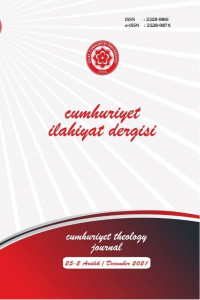Din Antropolojisinde Ontolojiye Dönüş: Avrupa Merkezli Miras ile Yüzleşme
Ontological Turn in Anthropology of Religion: Confrontation with European Legacy
Author(s): Hesna Serra AkselSubject(s): Anthropology, Theology and Religion, History of Religion
Published by: Cumhuriyet Üniversitesi İlahyat Fakültesi
Keywords: History of Religions; Anthropology; Anthropology of Religion; Ontological Turn; Representationalism;
Summary/Abstract: Criticism of post-modernizm and post-colonializm caused to question the mission of anthropology in terms of understanding different societies. Materialist, secular and anthropocentric anthropological approaches based on enlightenment and modern assumptions have faced criticism by many disciplines from philosophy and critical theory to science and quantum theory. Anthropology of religion which is a branch of cultural anthropology is also effected by changes within the broader field of anthropology. The aim of this project is to shed light on the potential of the critical approach, which emerged in anthropology of religion recently and underlined the ontology, to understand religious experiences and practices of different societies. This approach is called ontological turn. In this article, first I point out the historical process in anthropology which led to the turn to ontology. Social structuralism and representationalism which played an important role for the formation of anthropology impacted significantly the ways in which anthropology understands nature and human being. According to these assumptions commonly used in anthropology, while human beings try to understand universal and static natural law principles, they create representations about nature. But, for there is only one nature, there must be only one true representation. This attempt to understand nature through representations created the base for the concepts of belief, knowledge, and mind of Edward Tylor who was the pioneer of cultural anthropology. While the mind refers to rational capacity of human being, belief is an area of irrational representations that human beings pragmatically need. Religious assumptions and practices are listed under incorrect representations. The concept of belief has been frequently used after Tylor as well to understand societies which are located outside of modernity. What ontological turn aims with criticism of conceptual framework is to prevent the domination of Western based reality. Therefore, one of the most emphasized arguments is the multiplicity of reality. This approach of ontological turn is called as taking everything serious. New definitions which are made in a way including the experiences of ethnographic objects mean taking them serious. Acceptance of the concepts by anthropologist in the ethnographic field means acceptance of difference in reality. The act of definition and conceptualizing is the act of creating different realities. In many ethnographic researches, ethnographers choses their concepts before entering to the field. This means that trying to fit differences within existing concepts and confirming the existing thoughts from different perspectives. Understanding ethnographic materials with its own terms or analyzing, explaining or interpreting ethnographic phenomenon by eliminating presumptions was always a concern for anthropology. These questions are asked so commonly that they can be seen as banal questions. The difference of ontological turn is not to ask these questions, but to ask ontological questions as an epistemological approach. The base of this ontological approach is the thought that what forms anthropologists’ perspective are not social or cultural but ontological assumptions. Thus, the question to be asked is how anthropologists’ assumptions about what the world is can be eliminated. To sum up, the idea of taking everything serious in ontological turn aims to eliminate the hierarchy between the subject and object of ethnography. Instead of seeing ethnography as an object of anthropology through modern categories, ontological turn suggests seeing ethnography as a real source to create new concepts and analytical tools.
Journal: Cumhuriyet İlahiyat Dergisi
- Issue Year: 25/2021
- Issue No: 2
- Page Range: 679-694
- Page Count: 16
- Language: Turkish

